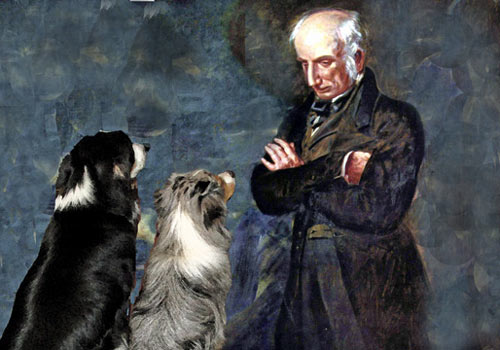不要总看名作家们人前风风光光,其实他们也有一些不为人知的古怪癖好哦。这些癖好有时候会体现出他们可爱而真实的一面。下面就让我们一起来看一下吧。

Do you think that wordsmiths are a little peculiar? Does fiddling around with vowels and consonants all day drive our eccentricities, or were we just born that way? Most of us probably aren’t as strange as we think we are ... relatively speaking, of course!
Here are some examples of famous authors who definitely had some, shall we say, unusual methods for keeping the words flowing.
• Victor Hugo wrote both Les Misèrables and The Hunchback of Notre-Dame in the nude so he wouldn’t be tempted to leave his house. He even had his valet hide his clothes.
• Demosthenes shaved half his head so that he would be too embarrassed to leave home until his writing was finished.
• Honoré de Balzac would down black coffee so he could write for long stretches—often for more than 48 hours at a time. (Hey, what’s weird about that?)
• Charles Dickens would go for walks (20 miles or so every day) and try to get lost in order to spark his creativity.
• James Joyce felt that it was a productive day if he composed just three sentences. (How would your manager feel about that?)
• Vladimir Nabokov wrote on index cards in no particular order. One of his books consisted of 2,000 index cards.
• William Wordsworth would recite his poetry to his dog while taking strolls. If the dog barked or was upset as he read, he would rewrite the draft.
• Friedrich Schiller kept a drawer full of rotten apples in his study. His wife claimed that he could not live or work without the awful aroma.
• Alexandre Dumas could only write poetry on yellow paper, articles on pink paper, and novels on blue paper.
• Edgar Allan Poe ’s beloved cat, Catterina, would sit on Poe’s shoulders while he wrote.
• French novelist Colette always plucked fleas from her bulldog until she was ready to write.
• Gertrude Stein claimed that she wrote best while seated in a parked car.
• Agatha Christie wrote while taking baths and eating apples.
• For many years, Maya Angelou only worked in the plainest of hotel rooms, solely accompanied by a dictionary, a Bible, a deck of cards, and a bottle of sherry.
• Jack Kerouac wrote On the Road on 120 feet of taped-together paper so that his stream-of-consciousness writing style would not be interrupted by the need to add new sheets of paper to the typewriter.
• T.S. Eliot would tint his face green with powder to look like he was dead.
注解:
1. wordsmith: 擅长文字的人,作家。
2. fiddle around: 虚度光阴;vowel: 元音字母;consonant: 辅音字母;eccentricity: 古怪,怪癖。
3. Victor Hugo: 维克多•雨果(1802—1885),法国作家,19世纪前期积极浪漫主义文学运动的代表作家;Les Misèrables: 《悲惨世界》,是雨果于1862年所发表的一部长篇小说,19世纪最著名的小说之一,小说涵盖了拿破仑战争和之后的十几年的时间;The Hunchback of Notre-Dame: 《巴黎圣母院》, 维克多•雨果的又一著名作品,故事的场景设定在1482年的巴黎圣母院,内容环绕一名吉卜赛少女爱丝梅拉达和由副主教克洛德•弗洛罗养大的圣母院驼背敲钟人卡西莫多;nude: 裸体的。
4. valet: 男子的贴身男仆。
5. Demosthenes: 德摩斯梯尼(前384—前322年),古雅典雄辩家、民主派政治家,早年从伊萨学习修辞,后教授辞学。积极从事政治活动,极力反对马其顿入侵希腊。后在雅典组织反马其顿运动,失败后自杀身亡。
6. Honoré de Balzac: 奥诺雷•德•巴尔扎克(1799—1850),法国小说家,被称为现代法国小说之父;down: v.(尤指大口或快速地)喝下。
7. weired: 古怪的,异乎寻常的。
8. Charles Dickens: 查尔斯•狄更斯(1812—1870),19世纪英国批判现实主义小说家。狄更斯特别注意描写生活在英国社会底层的“小人物”的生活遭遇,深刻地反映了当时英国复杂的社会现实,为英国批判现实主义文学的开拓和发展做出了卓越的贡献;spark: 激发,激励。
9. James Joyce: 詹姆斯•乔伊斯(1882—1941),爱尔兰作家、诗人,20世纪最伟大的作家之一,后现代文学的奠基者之一,其作品及“意识流”思想对世界文坛影响巨大;compose: 创作(乐曲、诗歌等)。
10. Vladimir Nabokov: 弗拉基米尔•纳博科夫(1899—1977),是一名俄裔美籍作家,1899年出生于俄罗斯圣彼得堡。他在美国创作了他的文学作品《洛丽塔》,但真正使他成为一个著名散文家的是他用英语写出的作品。他同样也在昆虫学、象棋等领域有所贡献。
11. William Wordsworth : 威廉•华兹华斯,英国诗人;taking a stroll: 散步。
12. Friedrich Schiller: 弗里德里希•席勒(1759—1805),德国18世纪著名诗人、哲学家、历史学家和剧作家,德国启蒙文学的代表人物之一。
13. awful: 糟糕的,可怕的;aroma: 气味。
14. Alexandre Dumas: 亚历山大•仲马(1802—1870),又称大仲马,法国19世纪浪漫主义作家。大仲马各种著作达300卷之多,以小说和剧作为主。代表作有:《亨利第三及其宫廷》(剧本)、《基督山伯爵》(长篇小说)、《三个火枪手》(长篇小说)等。
15. Edgar Allan Poe: 埃德加•爱伦•坡(1809—1849)19世纪美国诗人、小说家和文学评论家,美国浪漫主义思潮时期的重要成员。
16. Colette:科莱特(1873—1954),法国女作家,出版了超过五十本小说,多数带有自传色彩,其基调大致可分为田园牧歌式的清晰自然与情欲爱恨的苦痛挣扎、内心纠葛两类。其创作风格细腻入微,并且惊人的直率。她最出名的作品GIGI,不仅多次改编为电影、舞台剧,而且在美国也引起了轰动;pluck: 拔掉,捉住;flea: 跳蚤;bulldog: 斗牛犬。
17. Gertrude Stein: 格特鲁德•斯泰因(1874—1946),美国作家与诗人。
18. Agatha Christie: 阿加莎•克里斯蒂(1890—1976),英国著名女侦探小说家、剧作家,三大推理文学宗师之一。
19. 玛娅•安杰洛多年来只在酒店最底层的房间内工作,陪伴她的只有一本字典、一本《圣经》、一副扑克牌还有一瓶雪利酒。Maya Angelou: 玛娅•安杰洛,(1928— ),美国文坛最 耀眼的黑人女作家和诗人。出版过10部畅销书。她是美国有名的演员、导演、制片人和影视 剧作家,是好莱坞第一黑人女导演。
20. 杰克•凯鲁亚克的《在路上》这本小说写在一捆120页厚的纸上,这样他的意识流派写作风格就不会因为需要往打字机中添加新的纸张而被打断。Jack Kerouac: 杰克•凯鲁亚克(1922—1969),是美国“垮掉的一代”的代表人物。他的主要作品有自传体小说《在路上》、《达摩流浪者》、《荒凉天使》、《孤独旅者》等。他以离经叛道、惊世骇俗的生活方式与文学主张,震撼了20世纪五六十年代美国主流文化的价值观与社会观。凯鲁亚克在小说中创造了一种全新的自动写作手法——“狂野散文”; stream-of-consciousness: 意识流。
21. T.S. Eliot: 艾略特(1888—1965),是一位诗人、剧作家和文学批评家,诗歌现代派运动领袖。
 免费试听
免费试听

时长 : 5:22 主讲 : 金格妃

时长 : 27:51 主讲 : 金格妃

时长 : 17:20 主讲 : 郭宁

时长 : 3:54 主讲 : 金格妃

时长 : 26:58 主讲 : 乔迪

时长 : 26:58 主讲 : 乔迪

时长 : 26:58 主讲 : 乔迪

时长 : 3:54 主讲 : 金格妃

时长 : 1:46 主讲 : 金格妃
 推荐阅读
推荐阅读
每天分享一篇中英双语美文,对英语口语的练习很有帮助,也是积累英语考试中写作,翻译素材的好资料,加油吧! Life is not easy
来源 : 网络 2021-08-12 17:02:00 关键字 : 双语美文
每天分享一篇中英双语美文,对英语口语的练习很有帮助,也是积累英语考试中写作,翻译素材的好资料,加油吧! The art of living
来源 : 网络 2021-08-11 17:02:46 关键字 : 双语美文
每天分享一篇中英双语美文,对英语口语的练习很有帮助,也是积累英语考试中写作,翻译素材的好资料,加油吧! 1 Without you,I& 39
来源 : 网络 2021-08-11 16:08:34 关键字 : 双语美文
每天分享一篇中英双语美文,对英语口语的练习很有帮助,也是积累英语考试中写作,翻译素材的好资料,加油吧! 作家Gerald Durrell写
来源 : 网络 2021-08-11 16:05:41 关键字 : 双语美文
每天分享一篇中英双语美文,对英语口语的练习很有帮助,也是积累英语考试中写作,翻译素材的好资料,加油吧! 1 Muhhamad Ali Ji
来源 : 网络 2021-08-11 16:05:06 关键字 : 双语美文
每天分享一篇中英双语美文,对英语口语的练习很有帮助,也是积累英语考试中写作,翻译素材的好资料,加油吧! 人人常常会感觉到不幸
来源 : 网络 2021-08-11 16:04:03 关键字 : 双语美文
每天分享一篇中英双语美文,对英语口语的练习很有帮助,也是积累英语考试中写作,翻译素材的好资料,加油吧! At this moment you
来源 : 网络 2021-08-01 17:43:00 关键字 : 双语美文
每天分享一篇中英双语美文,对英语口语的练习很有帮助,也是积累英语考试中写作,翻译素材的好资料,加油吧! Already run one mi
来源 : 网络 2021-07-31 17:42:00 关键字 : 双语美文
每天分享一篇中英双语美文,对英语口语的练习很有帮助,也是积累英语考试中写作,翻译素材的好资料,加油吧! Dear son 孩子:
来源 : 网络 2021-07-31 17:41:00 关键字 : 双语美文
每天分享一篇中英双语美文,对英语口语的练习很有帮助,也是积累英语考试中写作,翻译素材的好资料,加油吧! Sometimes I really
来源 : 网络 2021-07-31 17:35:00 关键字 : 双语美文
